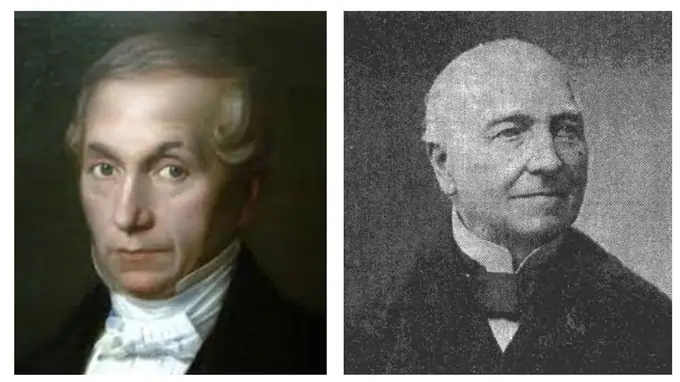
Ferdinand Berthier: The Trailblazing Deaf Educator of 19th Century France
Ferdinand Berthier came into the world on September 30, 1803, in Louhans, France. He would become a prominent French deaf leader who laid the groundwork for modern deaf education and advocacy. Berthier’s life and work revolutionized the way society viewed and treated deaf individuals. His story is one of perseverance, innovation, and unwavering dedication to the deaf community.
But why should you care about Ferdinand Berthier? His contributions have shaped the lives of countless deaf and hard of hearing individuals, and his philosophy continues to inspire advocacy efforts today. As we explore Berthier’s remarkable journey, you’ll discover how one man’s vision transformed an entire community and challenged societal norms.
Who was Ferdinand Berthier and why is he important to the deaf community?
Early life and education of Ferdinand Berthier
Born deaf, Berthier faced numerous challenges from an early age. In a time when deaf individuals were often marginalized and misunderstood, he defied expectations and pursued education with determination.
At the age of eight, Berthier joined the National Institute for the Deaf in Paris. This decision would shape the course of his life and set him on a path to becoming a trailblazer in deaf education and advocacy.
Berthier’s role as a pioneer in deaf education
As Berthier grew older, he recognized the immense potential within the deaf community. He strongly believed that with proper education and support, deaf individuals could achieve greatness. This conviction drove him to become a teacher and advocate for the deaf.
Berthier’s innovative approaches to education challenged the status quo and demonstrated the capabilities of deaf individuals. But what exactly did he do that was so revolutionary? We’ll explore his groundbreaking methods in the next section.
The impact of Berthier on deaf culture and history
Ferdinand Berthier’s influence extends far beyond his lifetime. His work fostered a sense of pride and community among the deaf, laying the foundation for what we now recognize as deaf culture. By advocating for the use of sign language and promoting the rights of deaf individuals, Berthier helped shape the fabric of deaf history.
But how did Berthier’s ideas translate into practical changes for the deaf community? Let’s delve deeper into his contributions to deaf education in France.
How did Ferdinand Berthier contribute to deaf education in France?
Berthier’s innovative teaching methods for deaf students
Berthier was a prolific educator who dedicated much of his life to improving education for the deaf. He developed teaching methods that emphasized visual learning and the use of French Sign Language. These approaches were revolutionary at a time when many still believed that oral education was the only way to teach deaf students.
By focusing on sign language as a primary mode of communication, Berthier showed that deaf students could learn and express complex ideas just as effectively as their hearing peers. This shift in perspective opened up new possibilities for deaf education.
His efforts in promoting sign language in education
Berthier strongly advocated for the recognition of sign language as a legitimate form of communication. He argued that sign language was not just a tool for basic interaction, but a rich, expressive language capable of conveying nuanced ideas and emotions.
Through his writings and public speeches, Berthier challenged the prevailing notion that speech was necessary for intellectual development. He demonstrated that deaf individuals could thrive academically and professionally when given access to education in their natural language.
The establishment of the Société Centrale des Sourds-Muets
In 1838, Berthier founded the Société Centrale des Sourds-Muets (Central Society of the Deaf-Mute), one of the first organizations of its kind. This society provided a platform for deaf individuals to come together, share ideas, and advocate for their rights.
The establishment of this society was a significant milestone in deaf history. It gave deaf people a collective voice and a means to influence society’s understanding of deafness. But what philosophy guided Berthier’s efforts? Let’s examine his influential “self-help” concept.
What was the significance of Berthier’s “self-help is the best help” philosophy?
The origins and meaning of Berthier’s self-help concept
Berthier coined the phrase “self-help is the best help” as a rallying cry for the deaf community. This philosophy emphasized the importance of deaf individuals taking charge of their own lives and working together to overcome challenges.
But what did this mean in practice? Berthier believed that deaf people should not rely solely on hearing people for assistance or guidance. Instead, he encouraged them to develop their own solutions and support systems within the deaf community.
How this philosophy empowered the deaf community
Berthier’s self-help philosophy had a profound impact on the deaf community. It instilled a sense of pride and self-reliance among deaf individuals, encouraging them to view themselves as capable and deserving of respect.
This concept also led to the creation of deaf-led organizations and schools, where deaf individuals could learn from and support one another. But how did this philosophy translate into long-term changes for the deaf community?
Long-term impact on deaf advocacy and education
The self-help philosophy laid the groundwork for modern deaf advocacy movements. It inspired generations of deaf leaders to fight for their rights and take an active role in shaping policies that affect their lives.
In education, this philosophy led to the development of bilingual-bicultural approaches that value both sign language and written language. These methods continue to be used in many schools for the deaf today.
But Berthier’s influence wasn’t limited to education and self-help. How did his work change society’s perception of deaf individuals?
How did Berthier’s work influence the recognition of deaf individuals in society?
Berthier’s efforts to improve societal perceptions of deafness
Berthier tirelessly worked to challenge negative stereotypes about deaf people. He showcased the achievements of deaf individuals in various aspects of life, from art and literature to science and philosophy.
Through his own accomplishments as a deaf educator and intellectual, Berthier demonstrated that deafness was not a barrier to success. He was awarded the Légion d’honneur in 1849, becoming one of the first deaf individuals to receive this prestigious recognition.
His role in advocating for the rights of deaf people
Berthier was super outspoken about fighting for the rights of deaf folks. He pushed for legal recognition of sign language and fought against discriminatory practices that limited opportunities for deaf individuals.
His efforts contributed to important legal and social changes, paving the way for greater inclusivity and accessibility for deaf people in France and beyond.
The legacy of Berthier in modern deaf culture
Today, Berthier is remembered as a pivotal figure in deaf history. His ideas about deaf empowerment and self-advocacy continue to influence deaf culture worldwide.
Many of the rights and opportunities that deaf individuals enjoy today can be traced back to the groundwork laid by Berthier and his contemporaries. But Berthier didn’t work in isolation. Who were the key figures that influenced his work?
What was Ferdinand Berthier’s relationship with Abbé de l’Épée?
Ferdinand Berthier and l’abbé de l’Épée were like the dynamic duo when it came to advocacy for deaf rights and education. Berthier totally admired de l’Épée’s contributions to the deaf community and his belief that deaf as capable and deserving of an education.
They both made huge strides in the empowerment of the deaf community and left a lasting mark in the annals of deaf history. Thanks to them, the deaf community worldwide saw a wave of change, recognizing the contributions of deaf individuals as valuable.
Berthier followed in de l’Épée’s footsteps to help the deaf and continued the mission to show that deaf and mute people were just as capable. Their work made a big difference in how society viewed deaf mutes and opened doors for many.
Berthier’s admiration for Abbé de l’Épée’s work
Abbé Charles-Michel de l’Épée, who founded the first public school for the deaf in Paris, was a significant influence on Berthier. Although Berthier never met de l’Épée personally, he greatly admired his work and contributions to deaf education.
Berthier wrote extensively about de l’Épée’s life and methods, helping to preserve and propagate his legacy. But how did Berthier build upon de l’Épée’s foundational work?
How Berthier built upon and expanded de l’Épée’s educational methods
While Berthier respected de l’Épée’s methods, he also recognized areas for improvement. He expanded on de l’Épée’s use of sign language, developing more sophisticated teaching techniques and advocating for its use beyond the classroom.
Berthier’s work represents a bridge between early pioneers like de l’Épée and modern approaches to deaf education. But what experiences shaped Berthier’s own educational philosophy?
How did Berthier’s early career shape his later achievements?
Berthier’s experiences as a deaf student and educator
Berthier’s time as a student at the National Institute for the Deaf in Paris profoundly influenced his later work. He experienced firsthand the challenges and potential of deaf education, which informed his innovative teaching methods.
As a young teacher, Berthier quickly gained recognition for his skill and dedication. His success in the classroom gave him the credibility to advocate for broader changes in deaf education.
Key influences and mentors in his formative years
While at the Institute, Berthier was mentored by several influential deaf educators, including Jean Massieu and Laurent Clerc. These relationships helped shape his understanding of deaf culture and education.
Berthier’s interactions with hearing educators and administrators also influenced his approach to advocacy, teaching him the importance of bridge-building between deaf and hearing communities.
What is Ferdinand Berthier’s lasting legacy in deaf education and advocacy?
Ferdinand Berthier was a prominent figure in the education of the deaf community and an advocate for the deaf community. He founded the Central Society of the Deaf, emphasizing that self help is the best help. His legacy of Ferdinand Berthier includes the recognition of the deaf and their rights.
Through his analysis of his early career, we see how Ferdinand Berthier stands as a pioneer for individuals with hearing impairments. The story of Ferdinand Berthier is one of dedication to the education of the deaf and supporting people who are deaf. Berthier was awarded numerous honors for his contributions.
His life and times also inspired deaf artists and others in the community. Today, his work continues to impact deaf or hard of hearing individuals, proving that self help is the best help indeed.
The continued relevance of Berthier’s ideas in modern deaf education
Many of Berthier’s core principles remain relevant in deaf education today. His emphasis on visual learning, the importance of sign language, and the value of deaf role models continue to influence educational practices worldwide.
Bilingual-bicultural education, which values both sign language and written language, can be traced back to Berthier’s pioneering work. But how has his influence extended beyond education?
His influence on subsequent generations of deaf educators and advocates
Berthier’s life and work have inspired countless deaf individuals to become educators, leaders, and advocates. His emphasis on self-reliance and community empowerment continues to resonate within the deaf community.
Many deaf organizations around the world draw inspiration from the Société Centrale des Sourds-Muets, adapting Berthier’s model of community organizing to modern contexts.
Berthier’s place in the history of deaf rights and recognition
Ferdinand Berthier passed away on July 12, 1886, but his legacy lives on. He is remembered as a key figure in the fight for deaf rights and recognition, laying the groundwork for many of the legal and social advancements that followed.
Berthier’s life story serves as a powerful reminder of the impact one individual can have in challenging societal norms and advocating for marginalized communities. His unwavering commitment to the deaf community continues to inspire deaf and hard of hearing individuals worldwide.
As we reflect on Berthier’s contributions, we’re left with an important question: How can we continue to build on his legacy and work towards greater understanding and recognition of deaf individuals in our society today?




